As a member of the Rajya Sabha representing the Congress party he had the tenacity to be the first signatory in moving a privilege motion against his party's prime minister.
Natwar Singh submitted a notice on Friday night to Rajya Sabha Chairman Bhairon Singh Shekhawat against Dr Manmohan Singh for what was described as the 'deliberate' leak of Justice R S Pathak's report on the Volcker Committee oil for food inquiry.
The former external affairs minister has accused the Congress-led United Progressive Alliance government of violating parliamentary norms by revealing the contents of the report to the media even when the monsoon session of Parliament is on.
The Pathak Committee report has reportedly indicted Natwar Singh and his son Jagat Singh, a Congress party legislator from Rajasthan, for 'misusing' their position in getting contracts in the United Nations oil for food programme in Iraq during the Saddam Hussein regime.
Justice Pathak is reported to have exonerated the Congress party while indicting Natwar Singh and his son for misuse of their position.
Both Natwar Singh and the Congress party were described as 'non-contractual beneficiaries' in the Volcker report that went into allegations of kickbacks in the oil contracts.
Natwar Singh believes the Pathak report was deliberated leaked to malign him.
The privilege motion, which is unlikely to be admitted or may be withdrawn, has sent the signal that before he quits the party or is suspended from the Congress Natwar Singh wants to inflict maximum damage to his party, and particularly to Prime Minister Manmohan Singh.
A senior Bharatiya Janata Party member of the Rajya Sabha told rediff.com, "We don't think Natwar Singh's move is wise because who cares who leaked the report? The motion is shifting attention to a non-issue. We want to know who took money. How can you absolve the Congress? We want to know the truth."
Natwar Singh believes the prime minister has not kept his promise to conduct a fair investigation. Particularly, he was led to believe that he would not be hounded by the Enforcement Directorate.
"Internal Congress rivalries and the weight of his vanity over the years is drowning him," quipped a Congress leader.
Natwar Singh also believes the pro-United States lobby in his party is behind his downfall.
His grouse is fodder for the Communist and other Opposition parties.
Speaking on the issue of Natwar Singh's involvement in the Volcker report at a conclave organised by the Hindustan Times newspaper earlier this year, Sonia Gandhi clearly distanced herself from a man who was seen as always close to the Nehru family.
His relationship with Sonia Gandhi snapped as soon as the Volcker report appeared, and subsequent events have revealed that the Congress president has not had a change of heart over him.
Natwar Singh seems to be aware of this and that is why he has resorted to a bigger gamble.
A senior Congress leader and a former ally of Natwar Singh told rediff.com, "When he saw the Enforcement Directorate, at the insistence of Finance Minister P Chidambaram, was active in getting at getting to the bottom of his and Jagat Singh's alleged involvement in the oil-for-food scam in Iraq, he resorted to building up momentum against the proposed India-US nuclear deal."
The Communists are more than willing to support Natwar Singh because the India-US nuclear agreement is a fundamental and ideological issue for the Left and means more than the politics of one-upmanship.
Congress party managers heard a formidable sound and fury in the Rajya Sabha last week against the nuclear agreement. The Congress and its allies have a slim majority in the Rajya Sabha. The Opposition would love to ensnare the UPA government in the Rajya Sabha over the issue.
Congressmen allege that Natwar Singh is briefing leaders of the Communist parties, the Samajwadi Party, even the BJP's Yashwant Sinha, a former external affairs minister, over the proposed nuclear treaty.
Natwar Singh is ideally placed to speak on the nuclear issue because as the then external affairs minister he was the one of the lead actors behind the July 18, 2005 agreement.
As the political establishment in New Delhi warily awaits the result of the acrimonious debate over the nuclear issue -- the Left and Opposition parties are demanding a resolution in both Houses of Parliament which can reflect the 'sense of House' against various 'stringent and some humiliating provisions of US law', which may not work in India's interests -- Natwar Singh's statements are being watched closely.
In Congress circles, Dr Manmohan Singh is seen as increasingly stubborn at arriving at a compromise over the demand for a parliamentarty debate and resolution over the nuclear issue.
A senior Congress leader told rediff.com, "The prime minister has made the nuclear deal a prestige issue. He is not ready to be flexible over it."
A Congressman added that Natwar Singh is trying to link his personal problems with the intra-party divide over the nuclear deal. Short-lived this attempt may be, but the Congress will have to endure some clumsy moments as the prime minister's credibility over issues concerning the US comes under the political scanner.
Speaking in Prime Minister Singh's defence, a senior Congress member said, "Dr Singh is right when he says that Parliament should wait before reacting. The US Senate has not yet finalised or voted on the nuclear bill. After the Senate vote, the US House of Representatives and Senate bills will be merged, and then the actual nuclear agreement between both countries will be finalised. Our Parliament should wait till the US bill takes final shape."
In Congress circles Prime Minister Singh has reportedly argued, 'Will Parliament form the foreign policy of India?'
Natwar Singh and other critics of the nuclear agreement want dissenting Congressmen to keep up the pressure on Dr Singh.
"Natwar Singh and his opportunist supporters will slowly try to turn the nuclear deal into a political liability for the Congress party," feels a Congress member of the Rajya Sabha.
The former external affairs minister is said to have prepared a detailed argument against the nuclear deal.
As the UPA government gets weaker, Defence Minister Pranab Mukherjee, who is more pragmatic and flexible than Dr Manmohan Singh or even Sonia Gandhi, has understood the ramifications of the current politics over the demand for a parlimentary resolution on the fundamental issue of parliamentary democracy.
Mukherjee is talking to the Communists about this; he has also taken note of the views of Congress members who are against the nuclear deal.
Sooner than later, Mukherjee, it is believed, will arrive at a compromise formula with Prakash Karat, general secretary of the Communist Party of India-Marxist.
Natwar Singh may not be known for his patience or modesty, but the Congress party's handling of the Volcker episode lacks both tact and strategy.
If and when he is suspended from the Congress party, Natwar Singh will hit out at Dr Manmohan Singh's adamant attitude over the nuclear debate issue.
Already, journalists are being 'briefed' by the prime minister's opponents about how during then prime minister P V Narasimha Rao's government, Dr Manmohan Singh, then India's finance minister, was against India building a nuclear arsenal. Dr Singh, the briefing claims, advocated diverting finances from India's nuclear programme for economic development.
Predictably, the Natwar Singh drama will soon drag the Congress party and in turn, Sonia Gandhi, into the Volcker controversy. Natwar Singh, after all, is currently hobnobbing with politicians who want to target Sonia Gandhi. Last year, when he was India's external affairs minister, Natwar Singh visited Iran. After spending two days in Tehran he visited the tomb of the mystical Persian poet Hafez in the beautiful city of Shiraz.
Visitors who seek direction in life are given a book of Hafez's poetry and asked to open a page.
The Persian poem on the page is said to signify what lies ahead for the person who opens the page.
When Natwar Singh opened the page of the Divan-e-Hafez, a broader translation of Hafez's poetry said:
You are seeking solitude/
Without getting worried enjoy life, have wine.
For centuries believers have taken Hafez's directions seriously.
This week Natwar Singh will discover if it is his destiny to find the solitude to enjoy a glass of wine.


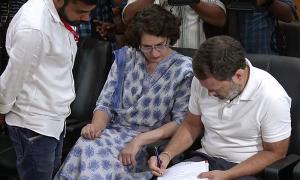
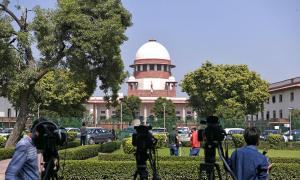

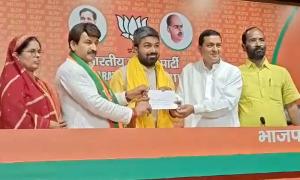
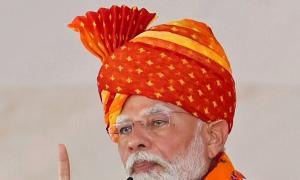
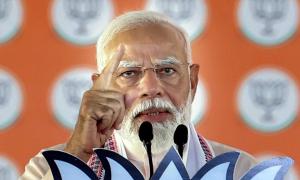
More from rediff